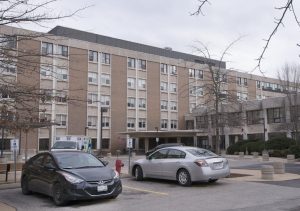COVID cases are ‘exploding’ in long-term care and retirement homes
Posted: November 18, 2020
(November 17, 2020)
By: Joanna Frketich, The Hamilton Spectator

“One tragedy on top of another tragedy,” was the prediction of the Registered Nurses’ Association of Ontario between waves of the pandemic when no meaningful changes were made to shore up seniors’ homes.
“Unfortunately, I was right,” said CEO Doris Grinspun. “The number of residents with COVID is increasing, the number of staff with COVID is increasing and the number of residents who die is increasing. How can anyone sleep well at night with that?”
“A horror movie,” was how Dr. Amit Arya describes the first wave in long-term care. The virus spread like wildfire, homes were desperately short-staffed and residents accounted for roughly two-thirds of deaths.
“We really have not done anything close to what we should have done to prepare for the second wave,” said Arya, assistant professor in palliative care at McMaster University.
As a result, “we’re shaping up to have a worse second wave,” says Natalie Mehra, executive director of the Ontario Health Coalition.
“It’s devastating,” said Mehra. “The numbers right now are just exploding.”
Outbreaks in Hamilton show seniors’ homes are again becoming the epicentre of the pandemic.
Hamilton had 21 deaths in 15 days at outbreaks in seniors’ homes from Nov. 2 to Nov. 16. Three were reported Tuesday from Chartwell Willowgrove long-term-care home, bringing Hamilton’s overall pandemic death toll to 70.
Twelve seniors have now died in the outbreak at the Ancaster home that has seen 67 infected since it was declared Oct. 22.
“We know that this is an exceptionally difficult time and the deep concern this creates for family members,” Chartwell spokesperson Sharon Ranalli said in a statement. “We continue to do everything possible to minimize the further transmission of the virus.”
The number of large active outbreaks in seniors’ homes in Hamilton is troubling.
St. Joseph’s Villa in Dundas has 38 cases and one death.
Hamilton Continuing Care at 125 Wentworth St. S. has 35 cases and four deaths.
Baywoods Place at 330 Main St. E. has 29 cases and one death.
The Village at Wentworth Heights at 1620 Upper Wentworth St. has 14 infections and two deaths.
Idlewyld Manor has nine cases, Aberdeen Gardens Retirement Residence has four, Amica Dundas has two and five more homes have one.
Ranalli says Chartwell has maintained “sufficient staffing levels” with help from temporary agencies. It’s working with the LHIN, public health and St. Joseph’s Healthcare.
Provincewide, Mehra says “staffing has crumbled.”
“The staffing levels were far too low after the first wave,” she said. “Now they’re at levels we’ve never seen and the homes don’t have the resilience to deal with it.”
Instead of hiring new staff for seniors’ homes during the lull between waves, Ontario lost workers, which Arya calls “a disaster and catastrophe.“
“People have left the profession in droves during the pandemic,” said Arya. “It’s not safe. You’re not getting sick leave. You’re not being paid a decent living-wage, so people have left for retail or the hospitality industry.”
The workers who are left are “exhausted” after putting in overtime and in some cases having their vacations cancelled, said Grinspun.
“They’re frustrated, exhausted, wanting to give good care and not able to because they don’t have enough hands,” she said. “On top of that, community spread is only increasing which brings the virus inside.”
Getting COVID-19 under control in the community is key to stopping the spread in seniors’ homes.
“As the level of community transmission goes up, inevitably the infections are happening in long-term care,” said Ontario’s associate chief medical officer of health, Dr. Barbara Yaffe. “Unfortunately in those settings, the infection … spreads quite quickly.”
Premier Doug Ford said Monday the province is considering using rapid testing at seniors’ homes despite questions about reliability.
“Rapid testing must be deployed on an urgent basis,” said Ranalli. “The very nature of the rapid spread of this virus, most especially for those who are asymptomatic … means we can’t depend on screening or surveillance testing alone.”
Grinspun says she’s tired of consultations and announcements but little action.
“If I was concerned in the summer I’m even more concerned today,” she said. “The province is sleeping at the switchboard.”
Click here for original article


